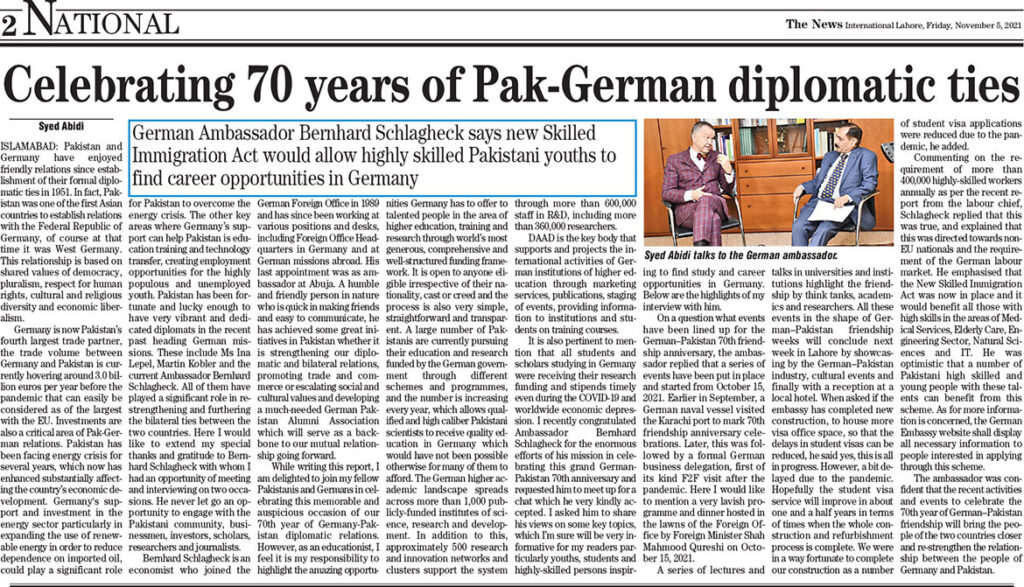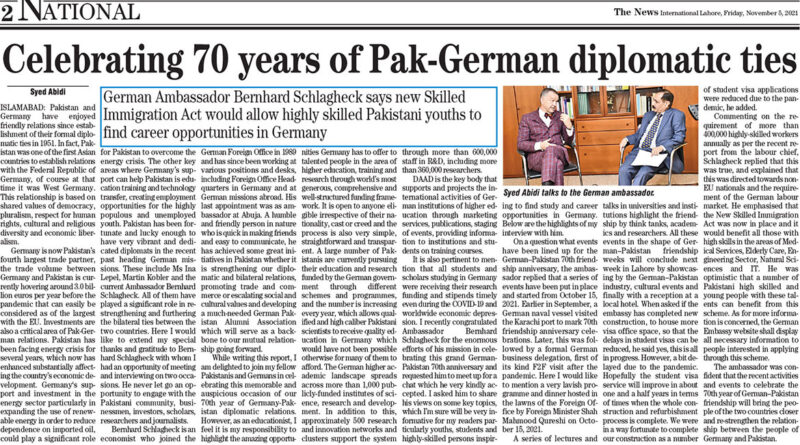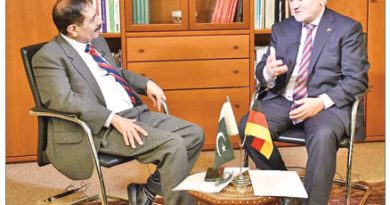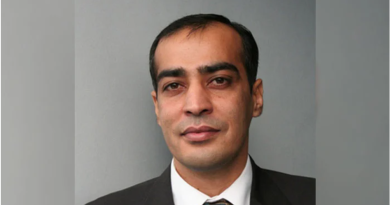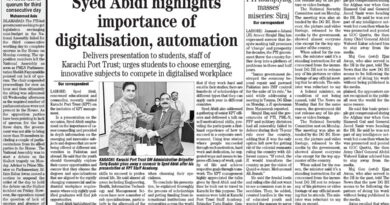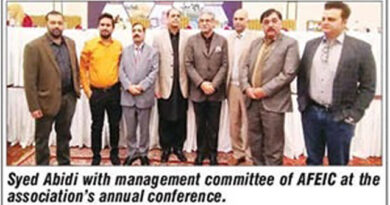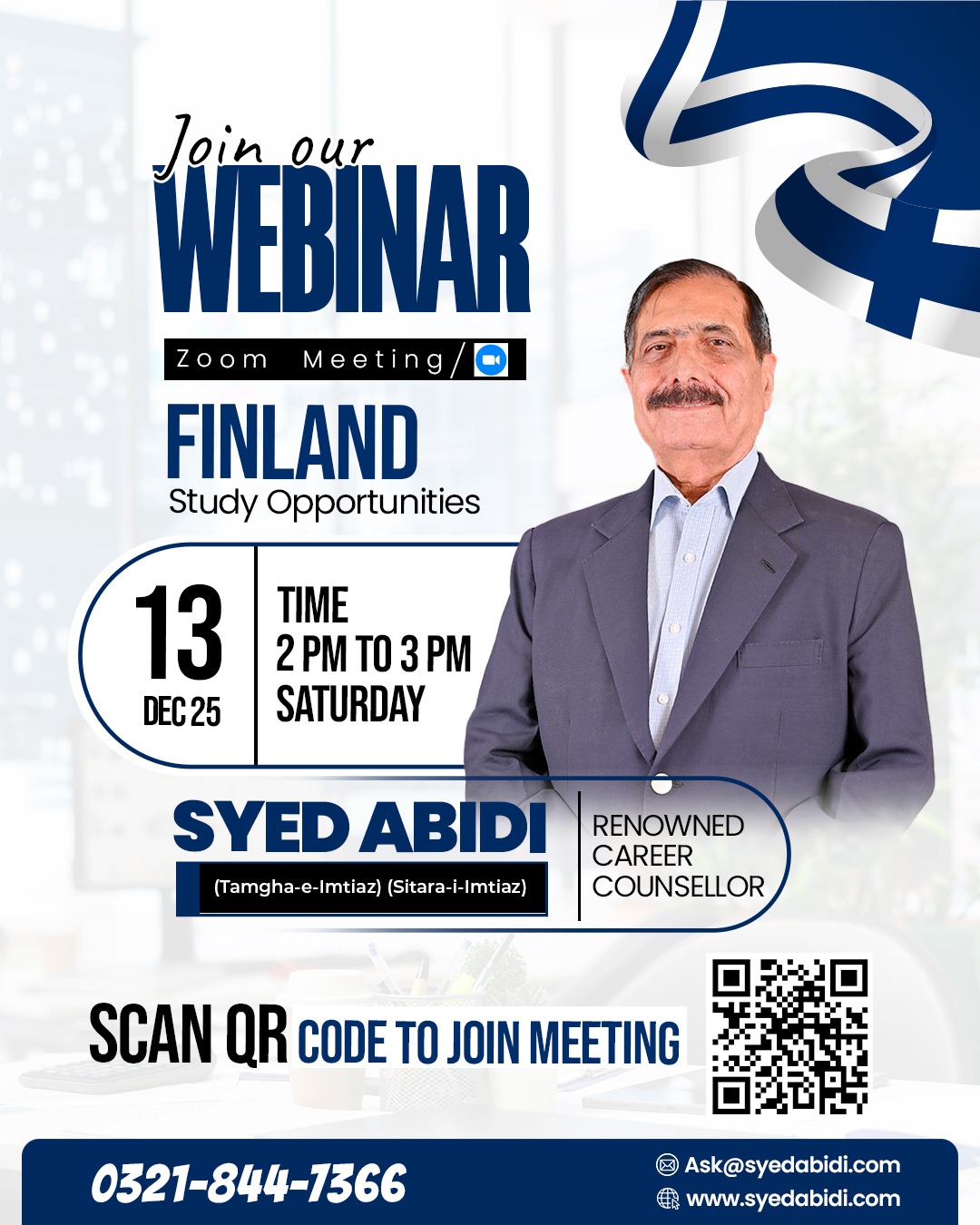Syed Abidi talks to the German Ambassador
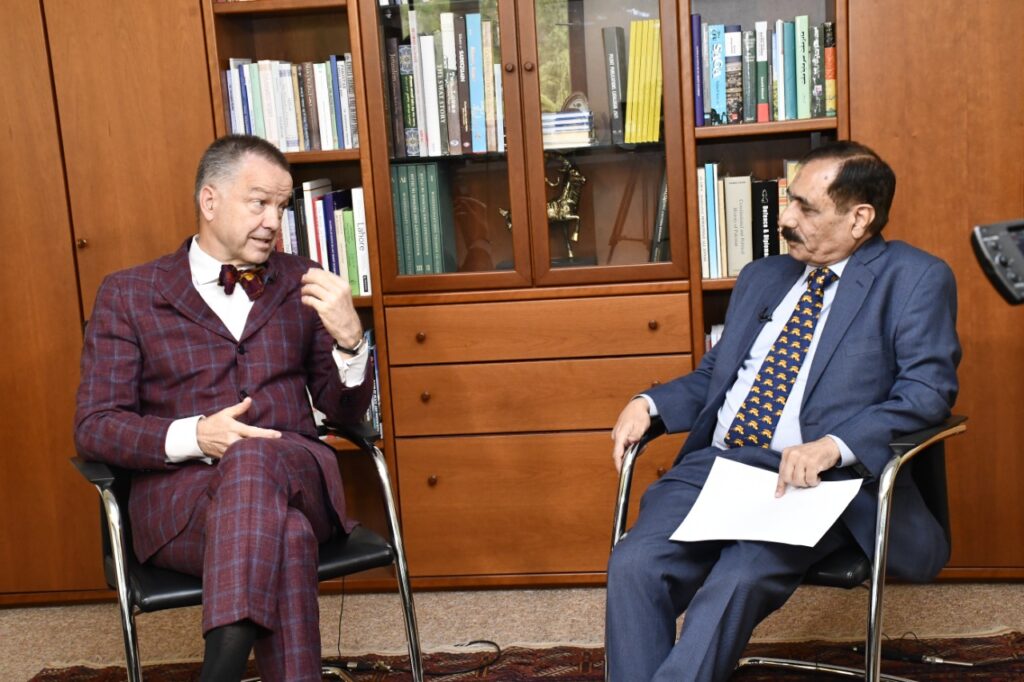
ISLAMABAD: Pakistan and Germany have enjoyed friendly relations since establishment of their formal diplomatic ties in 1951. In fact, Pakistan was one of the first Asian countries to establish relations with the Federal Republic of Germany, of course at that time it was West Germany. This relationship is based on shared values of democracy, pluralism, respect for human rights, cultural and religious diversity and economic liberalism.
Germany is now Pakistan’s fourth largest trade partner, the trade volume between Germany and Pakistan is currently hovering around 3.0 billion euros per year before the pandemic that can easily be considered as of the largest with the EU. Investments are also a critical area of Pak-German relations. Pakistan has been facing energy crisis for several years, which now has enhanced substantially affecting the country’s economic development. Germany‘s support and investment in the energy sector particularly in expanding the use of renewable energy in order to reduce dependence on imported oil, could play a significant role for Pakistan to overcome the energy crisis. The other key areas where Germany’s support can help Pakistan is education training and technology transfer, creating employment opportunities for the highly populous and unemployed youth. Pakistan has been fortunate and lucky enough to have very vibrant and dedicated diplomats in the recent past heading German missions. These include Ms Ina Lepel, Martin Kobler and the current Ambassador Bernhard Schlagheck. All of them have played a significant role in re-strengthening and furthering the bilateral ties between the two countries. Here I would like to extend my special thanks and gratitude to Bernhard Schlagheck with whom I had an opportunity of meeting and interviewing on two occasions. He never let go an opportunity to engage with the Pakistani community, businessmen, investors, scholars, researchers and journalists.
Bernhard Schlagheck is an economist who joined the German Foreign Office in 1989 and has since been working at various positions and desks, including Foreign Office Headquarters in Germany and at German missions abroad. His last appointment was as ambassador at Abuja. A humble and friendly person in nature who is quick in making friends and easy to communicate, he has achieved some great initiatives in Pakistan whether it is strengthening our diplomatic and bilateral relations, promoting trade and commerce or escalating social and cultural values and developing a much-needed German Pakistan Alumni Association which will serve as a backbone to our mutual relationship going forward.
While writing this report, I am delighted to join my fellow Pakistanis and Germans in celebrating this memorable and auspicious occasion of our 70th year of Germany-Pakistan diplomatic relations. However, as an educationist, I feel it is my responsibility to highlight the amazing opportunities Germany has to offer to talented people in the area of higher education, training and research through world’s most generous, comprehensive and well-structured funding framework. It is open to anyone eligible irrespective of their nationality, cast or creed and the process is also very simple, straightforward and transparent. A large number of Pakistanis are currently pursuing their education and research funded by the German government through different schemes and programmes, and the number is increasing every year, which allows qualified and high caliber Pakistani scientists to receive quality education in Germany which would have not been possible otherwise for many of them to afford. The German higher academic landscape spreads across more than 1,000 publicly-funded institutes of science, research and development. In addition to this, approximately 500 research and innovation networks and clusters support the system through more than 600,000 staff in R&D, including more than 360,000 researchers.
DAAD is the key body that supports and projects the international activities of German institutions of higher education through marketing services, publications, staging of events, providing information to institutions and students on training courses.
It is also pertinent to mention that all students and scholars studying in Germany were receiving their research funding and stipends timely even during the COVID-19 and worldwide economic depression. I recently congratulated Ambassador Bernhard Schlagheck for the enormous efforts of his mission in celebrating this grand German-Pakistan 70th anniversary and requested him to meet up for a chat which he very kindly accepted. I asked him to share his views on some key topics, which I’m sure will be very informative for my readers particularly youths, students and highly-skilled persons inspiring to find study and career opportunities in Germany. Below are the highlights of my interview with him.
On a question what events have been lined up for the German–Pakistan 70th friendship anniversary, the ambassador replied that a series of events have been put in place and started from October 15, 2021. Earlier in September, a German naval vessel visited the Karachi port to mark 70th friendship anniversary celebrations. Later, this was followed by a formal German business delegation, first of its kind F2F visit after the pandemic. Here I would like to mention a very lavish programme and dinner hosted in the lawns of the Foreign Office by Foreign Minister Shah Mahmood Qureshi on October 15, 2021.
A series of lectures and talks in universities and institutions highlight the friendship by think tanks, academics and researchers. All these events in the shape of German–Pakistan friendship weeks will conclude next week in Lahore by showcasing by the German–Pakistan industry, cultural events and finally with a reception at a local hotel. When asked if the embassy has completed new construction, to house more visa office space, so that the delays in student visas can be reduced, he said yes, this is all in progress. However, a bit delayed due to the pandemic. Hopefully the student visa service will improve in about one and a half years in terms of times when the whole construction and refurbishment process is complete. We were in a way fortunate to complete our construction as a number of student visa applications were reduced due to the pandemic, he added.
Commenting on the requirement of more than 400,000 highly-skilled workers annually as per the recent report from the labour chief, Schlagheck replied that this was true, and explained that this was directed towards non-EU nationals and the requirement of the German labour market. He emphasised that the New Skilled Immigration Act was now in place and it would benefit all those with high skills in the areas of Medical Services, Elderly Care, Engineering Sector, Natural Sciences and IT. He was optimistic that a number of Pakistani high skilled and young people with these talents can benefit from this scheme. As for more information is concerned, the German Embassy website shall display all necessary information to people interested in applying through this scheme.
The ambassador was confident that the recent activities and events to celebrate the 70th year of German–Pakistan friendship will bring the people of the two countries closer and re-strengthen the relationship between the people of Germany and Pakistan.
